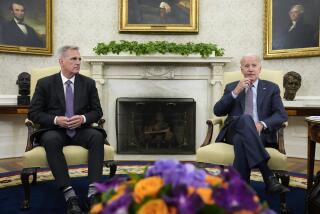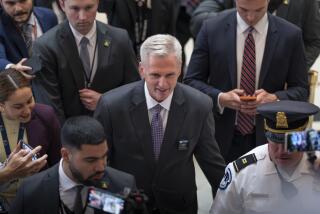Debt, deficits and delays
The National Commission on Fiscal Responsibility and Reform achieved something remarkable, at least by Washington’s standards: It came up with a plan to shrink the federal budget deficit and the national debt that drew support from both ends of the political spectrum. The consensus wasn’t broad enough, however. The plan won the votes of only 11 of the panel’s 18 members, not the 14 required to guarantee action in Congress. The experience is encouraging in some ways, showing areas of tax and spending policy where lawmakers are willing to compromise. But it also highlighted differences that will be hard to reconcile.
It’s hardly shocking that the commission couldn’t unite behind a plan that would have cut projected spending by $2.2 trillion between 2012 and 2020 while raising revenue by almost $1 trillion. The public is no less divided than lawmakers are about what to do. In fact, as much as Americans bemoan the fiscal problems in Washington, they’re showing little interest in cutting their own share of the federal pie. So it’s heartening to see at least some bipartisan agreement on measures that should be part of whatever plan Congress eventually adopts. These include slashing tax exemptions, deductions and credits in favor of a simpler tax code that raises more money at lower rates; pulling back on defense spending at least as aggressively as on nonsecurity programs; dramatically reducing farm subsidies; and adding enforcement mechanisms in the budget to prevent lawmakers from avoiding tough choices.
The “no” votes on the panel and the blowback to its plan, though, show how difficult it will be to move the discussion from commissions and task forces to the House and Senate floors. The first point of contention is when to start tightening Washington’s belt. Friday’s stunningly bad unemployment report, which showed the number of new hires dropping and joblessness rising in November, suggested that the commission’s plan, if it had been quickly adopted, would have applied the fiscal brakes before the economy was really moving again. That would have been a terrible mistake — a growing economy is vital to Congress’ ability to pull the federal government out of its deficit hole.
Panel members also disagreed sharply about the proper level of taxation and spending in an economy the size of the United States’ — in other words, what the “normal” size of government ought to be. Nor could the panel agree on how to control rising healthcare costs, with Republican dissenters insisting on repealing the new healthcare law. Abandoning the law’s reforms in how care is delivered and paid for would only make it harder to control costs, yet it’s a step many Republicans continue to insist on. And as long as they do, the prospects will remain dim for the kind of bipartisan compromise in Congress that the deficit commission’s majority reached on Friday.
More to Read
Get the L.A. Times Politics newsletter
Deeply reported insights into legislation, politics and policy from Sacramento, Washington and beyond. In your inbox three times per week.
You may occasionally receive promotional content from the Los Angeles Times.










